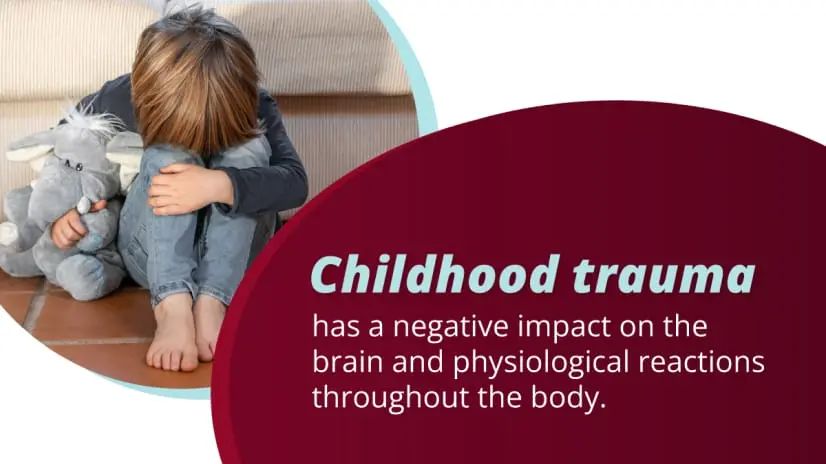
What Is The Link Between Trauma And Addiction?
Clinically Reviewed by:
Addiction has several root causes. However, childhood trauma is one of the leading causes of addiction. According to the National Institute of Health (NIH), about 77 percent of people treated for addiction and PTSD have a history of childhood trauma. It is evident that childhood traumas can be linked to addiction.
Several studies show a correlation between traumatic early life and addictive behavior in adults. People who have experienced trauma often turn to drugs or alcohol to self-medicate as a method of coping with emotional pain caused by the trauma.

Key Takeaways
Childhood trauma is a leading cause of addiction in late life. Here’s what you need to know:
- Early childhood trauma can impact a child’s development.
- Trauma may impair a child’s capability to form stable attachments.
- Exposure to trauma directly influences five areas of the limbic system.
- Many treatment services can help treat trauma and addiction.
Learn more about the link between trauma and addiction by reaching out to Indiana Center for Recovery.
Trauma Explained
Trauma is a significantly disturbing experience that overwhelms a person’s ability to cope. Trauma can result from physical or emotional harm such as child abuse, neglect, accidents, natural disasters, or witnessing violence. Traumatic events can have long-lasting effects on physical and mental health. It may also increase the risk of developing addiction.
Children rely on caretakers for care, nurture, and safety. Therefore, when a child is exposed to trauma, they become sensitive, which can result in physical or psychological developmental damage. If trauma is caused by a caretaker, it can impact their capability to form stable attachments.
According to the National Institute of Health (NIH), childhood trauma is categorized as when a child experiences an event that is emotionally unpleasant or distressing, resulting in long-term physical and mental damage. Trauma can occur when a child has a negative childhood where events are emotionally or physically overwhelming. Abuse, neglect, assault, exploitation, or bullying are all prime examples that can inflict trauma on any individual.
Here are some situations that can cause children trauma:
- Accidents
- Natural catastrophes
- War and civil unrest
- Medical treatment
- Loss of a parent or a caretaker
- Divorce
- Separation
- Adoption
How Trauma Affects The Brain
Childhood trauma has a negative impact on the brain and physiological reactions throughout the body. The limbic system is made up of a group of structures in the brain’s core and is responsible for our emotions and mental functions. When an individual is exposed to trauma, it influences five areas of the limbic system. Those five areas are as follows:
The Amygdala
The amygdala recognizes dangers and triggers fearful reactions. It also enforces human emotions while forming a correlation between experience and emotions. Those who have a history of childhood trauma have amygdala sensitivity, making it difficult to control fear and emotional reactions after exposure to danger. They may react with a fight or flight response to events that remind them of their abuse.
The Hippocampus
The hippocampus is the learning area of the brain. It controls how a person learns and develops memories. It becomes sensitive to stimuli when there is distress. Those who have experienced child abuse have a 12 percent smaller hippocampus versus those who have not experienced abuse. The effect of child abuse on the hippocampus can lead to several problems later in life. A person becomes prone to flashbacks and difficulty remembering memories. It can also impact how a child learns new information and has difficulty trusting others.
The Thalamus
The thalamus functions as a relay system. Sensory information is sent to the thalamus, where it processes the stimulant and sends crucial sensory information to the area of the brain linked to function. When an individual feels threatened, the thalamus will alert the subconscious area of the brain before individuals become consciously aware of the danger.
Childhood trauma-related connections affect how the thalamus responds to stimulants. Individuals who have prior childhood trauma often have a quick reaction to stimuli linked with the source of their trauma that are often triggered by smells and noises.
The Hypothalamus
The hypothalamus is responsible for regulating several body responses. Childhood trauma is likely to enhance hypothalamic activity. Children with trauma are often in a perpetual state of tension or anxiety. They become extremists in activities they engage in, whether it is all in or all out; there is rarely balance. For example, those who were abused as children tend to have an increased or decreased sex drive, and emotional reactions may seem intense or non-existent.
The Nucleus Accumbens
The nucleus accumbens is a crucial area of the brain’s reward system. When people do something they love, such as eating or achieving a goal, their reward system is activated. Those who experienced trauma as a child frequently resort to habits or substances to help them cope. This commonly manifests into drug abuse or self-harm, interfering with the brain’s reward system.
Link Between Trauma and Addiction
Addiction is a disease that involves compulsive drug use despite harmful effects. Although there are many factors, such as genetic, environmental, and psychological factors, that enable addiction, the Director of Clinical Development at Indiana Center for Recovery, Jackie Daniels, states that trauma is often the leading factor of addiction from a medical standpoint.
“Trauma and addiction are linked because drug use can be a way to handle the emotional pain caused by the traumatic incident. For instance, a person who has faced sexual abuse may turn to drugs to numb the emotional pain and escape past memories, which often leads to a cycle of addiction, causing further brain damage,” said Daniels.
Additionally, Daniels states that trauma changes the brain’s reward system, making individuals more susceptible to addiction. Studies show that trauma causes changes in the brain function for reward, motivation, and stress responses. In turn, the changes in brain response can develop addiction.
Treatment for Trauma and Addiction
Treatment for trauma and addiction normally involves a combination of therapies and personalized care that meet the needs of each individual. The following are the most common forms of treatment used for trauma and addiction.
Mental Health Treatment
Mental health treatment is designed to help people process and cope with the emotional distress related to traumatic experiences. Trauma-informed therapies often include Cognitive Behavioral Therapy (CBT), Prolonged Exposure Therapy (PE), and Eye Movement Desensitization and Reprocessing (EMDR). These types of therapies help individuals address negative thoughts and emotions, develop coping strategies, and create a sense of safety and control.
Substance Abuse Treatment
Substance abuse treatment is the basic foundation of any treatment for addiction. Those who are diagnosed with substance use disorder require medical treatment. Depending on the severity of their addiction, individuals may need detox, medication-assisted treatment, or inpatient treatment.
Detox and medication-assisted treatment are typically used simultaneously when removing drugs and alcohol from the body to safely manage withdrawal symptoms and reduce cravings. Those who are attending inpatient treatment live at residential facilities for a range of 30-90 days and are provided with intensive therapy and support.
Dual Diagnosis Treatment
Dual diagnosis treatment is a specialized treatment that addresses both trauma and addiction concurrently. This treatment uses a combination of trauma-focused therapies, substance abuse treatment, and psychiatric care to help people address the root causes of their addiction and establish healthy coping strategies.
Holistic Therapies
Holistic therapies such as yoga, meditation, and mindfulness are used to help treat trauma and addiction. These therapies can reduce stress, develop a stronger sense of self-awareness, and promote overall well-being.
Frequently Asked Questions (FAQ)
How does trauma lead to addiction?
Traumatic experiences create overwhelming fear, guilt, and sadness and can cause the brain to alter its functioning. When this occurs, individuals often turn to drugs and alcohol to self-medicate and soothe the intense, uncomfortable feelings. As the self-medicating cycle continues, an increase in brain damage and addiction becomes greater over time.
Is there a connection between trauma and addiction?
Yes, there is a strong connection between trauma and addiction. Traumatic events such as physical abuse, emotional abuse, and sexual abuse can lead to the development of behavioral issues and addiction. Those who experience trauma can develop addiction to cope with emotional pain to escape traumatic memories.
Trauma and Addiction Treatment at Indiana Center for Recovery
About 77 percent of people treated for addiction and PTSD have a history of childhood trauma, demonstrating the strong connection between traumatic experiences and substance use disorders. If you or a loved one is struggling with trauma and addiction, professional treatment that addresses both conditions simultaneously is essential, as people often turn to drugs or alcohol to self-medicate emotional pain caused by traumatic experiences. At Indiana Center for Recovery, we understand that trauma and addiction are deeply linked, and we provide specialized treatment programs designed to address both trauma and substance use disorders together for better recovery outcomes.
Comprehensive treatment for trauma and addiction begins with medically supervised medical detox programs to safely manage withdrawal symptoms, followed by intensive inpatient treatment for round-the-clock support or flexible outpatient treatment options for ongoing care. Our integrated dual diagnosis treatment addresses both trauma and addiction concurrently, combining trauma-focused mental health treatment with specialized addiction treatment programs. We use evidence-based therapies like Cognitive Behavioral Therapy and EMDR therapy to help individuals process traumatic experiences, develop healthy coping strategies, and break the cycle of using substances to numb emotional pain.
Healing from trauma and addiction is possible with professional help that addresses both conditions together. We offer treatment centers across Indiana where you can access specialized dual diagnosis treatment programs designed to help you process trauma and overcome addiction simultaneously. Our compassionate team understands that trauma changes the brain’s reward system and makes individuals more susceptible to addiction, and we provide trauma-informed care that addresses the root causes of both conditions. Call us today at (844) 650-0064 to learn more about our trauma and addiction treatment options and take the first step toward healing.






 100% Confidential
100% Confidential
